#october revolution
Text
Remember, remember the 7th of November when the sky was assaulted and the tsarist eagle was brought low by the might of the people!
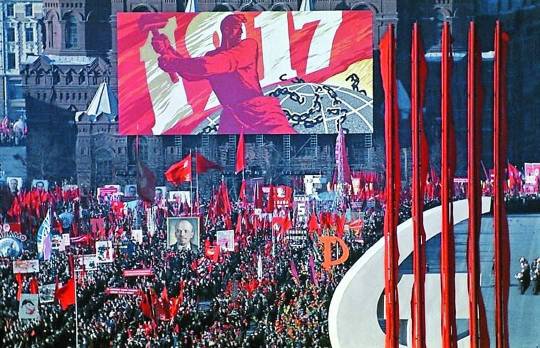
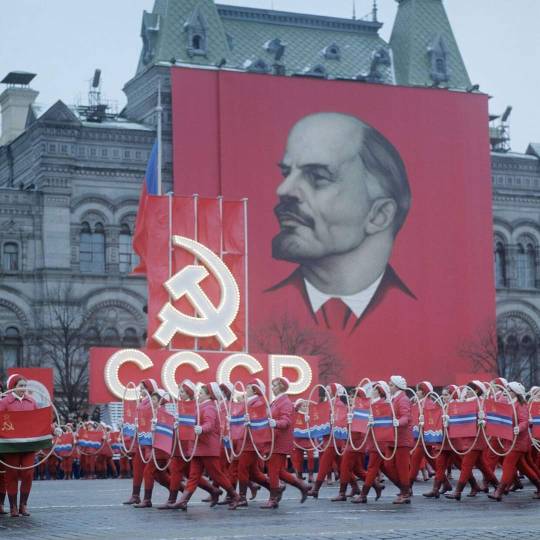
#socialismo#socialism#socialist#communism#marxism leninism#marxist leninist#marxist#marxismo#marxism#october revolution#vladimir lenin#lenin
256 notes
·
View notes
Text

#leningrad#lenin#leftism#anti capitalism#communism#socialism#anarchy#marxist leninist#vladimir lenin#stalin#karl marx#soviet union#marxism leninism#october revolution#bolsheviks#radical feminism#anti feminism#feminism#tweet#womens rights#fuck the patriarchy#feminist theory#female erasure#intersectional feminism
120 notes
·
View notes
Text

GLORY TO GREAT OCTOBER!
196 notes
·
View notes
Text

Meanwhile in tankie clownland
The reality of a butcher's shop with typically empty shelves in communist Poland circa 1982 vs the delusional clown world of mindless 21st century tankies living comfortable lives in western capitalist countries….
#history#soviet union#ussr#october revolution#communism#soviet bloc#poland#communist poland#prl#communism didn't work#but obviously it wasn't real communism#and it's bound to work next time#trust me bro#tankie#tankie clownland#useful idiot#keyboard warrior#ignorance is strength
25 notes
·
View notes
Text
Events as they happened, day-by-day, beginning with the 1917 October Revolution, possibly continued into the Russian Civil War.
As of now, the Bolsheviks control Petrograd and have just won Moscow. Grigory Zinoviev, Lev Kamenev, and others have just resigned from the government to protest Lenin’s position on negotiating a coalition with the Mensheviks and SRs. And, in southern Russia, Kaledin and the Don Cossacks are forming what will become the White Army…

#socialism#communism#marxism#politics#soviet union#history#october revolution#Bolsheviks#Vladimir Lenin#Petrograd#Moscow#Russian revolution#Russian civil war#red October
21 notes
·
View notes
Text
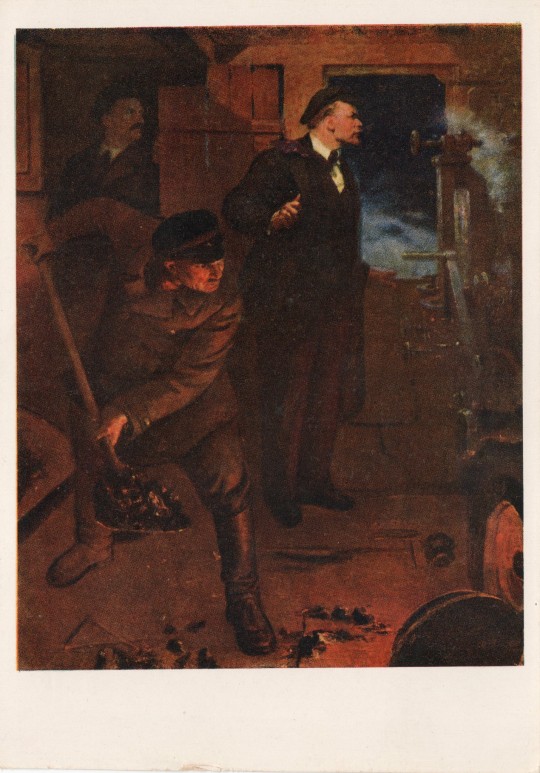
Pictured is the Painting До Петроград, on a Soviet Postcard, showing how the engineer Hugo Jalava smuggles Lenin across the Finnish border on their way to Petrograd
@sovietpostcards
@amtrak-official
34 notes
·
View notes
Text
"We must reject the outmoded idea that only Europe can show us the way. There is dogmatic Marxism and there is creative Marxism. I stand on the ground of the latter."
- J. V. Stalin, 1917
94 notes
·
View notes
Text
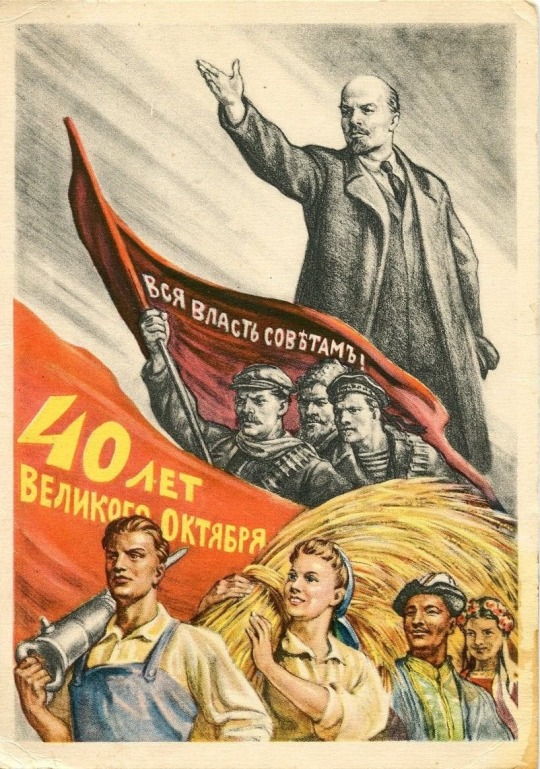
Soviet post card honoring the anniversary of the revolution (USSR 1957).
“40 Years of the Great October”
“All power to the Soviets”
111 notes
·
View notes
Text
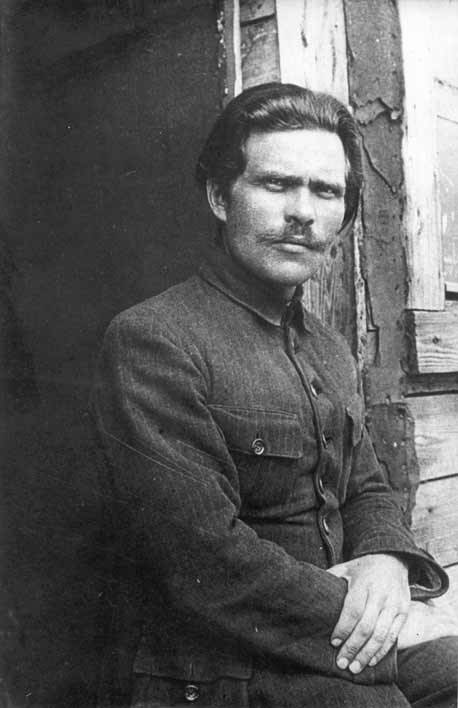

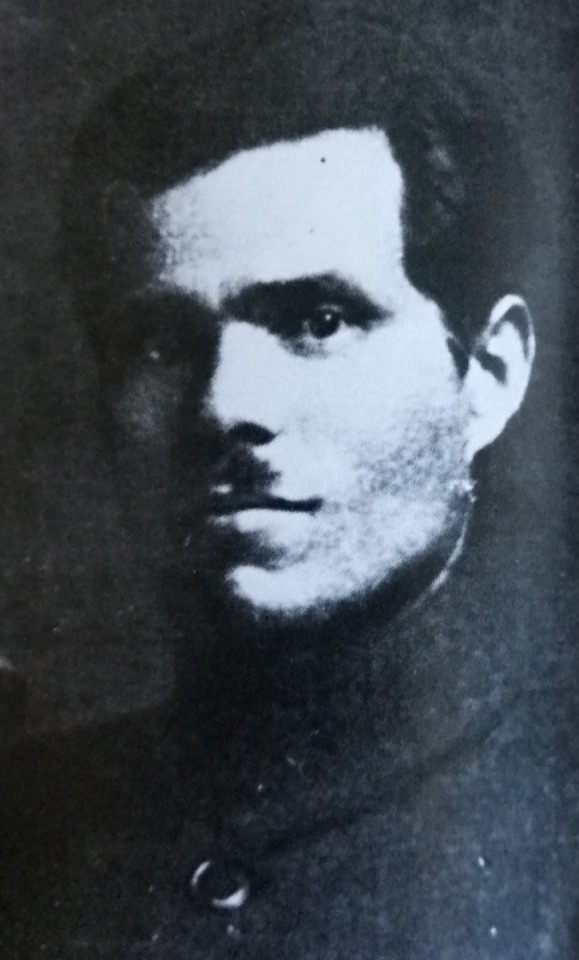
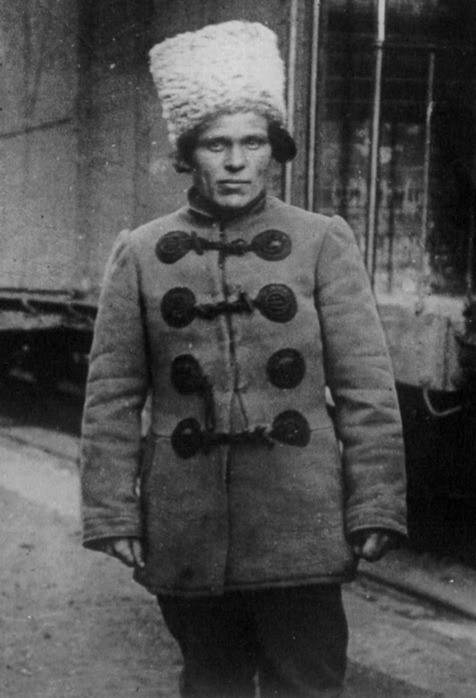

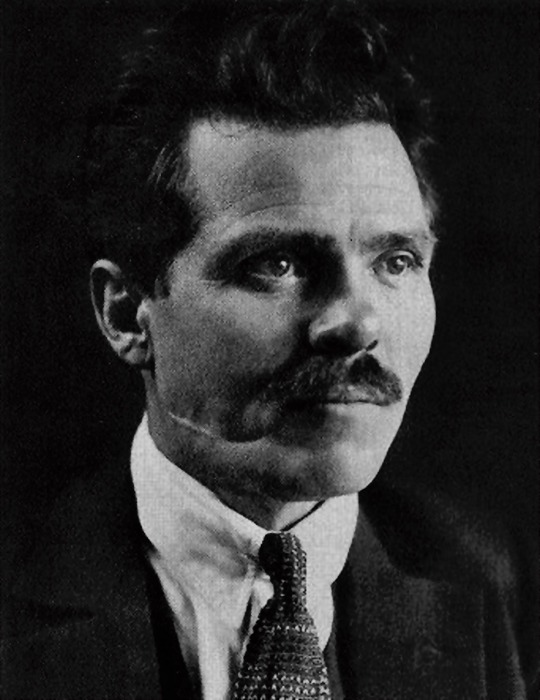
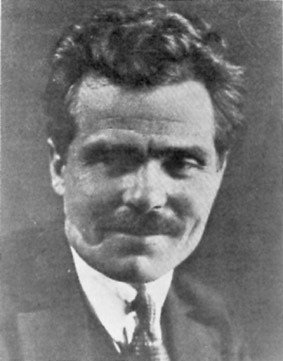
Nestor Makhno (1888-1934), Ukrainian anarchist revolutionary and commander of the Revolutionary Insurgent Army of Ukraine (Makhnovshchina), which was a predominantly peasant phenomenon that grew into a mass social movement. It was initially centered around Makhno's hometown Huliaipole but over the course of the Russian Civil War came to exert a strong influence over large areas of southern Ukraine. Makhno was aggressively opposed to all factions that sought to impose their authority over southern Ukraine, battling in succession the forces of the Ukrainian National Republic, the Central Powers of Germany and Austro-Hungary, the Hetmanate state, the White Army, the Bolshevik Red Army, and other smaller forces led by various Ukrainian atamans. Makhno and his supporters attempted to reorganize social and economic life along anarchist lines, including the establishment of communes on former landed estates, the requisition and egalitarian redistribution of land to the peasants, and the organization of free elections to local soviets (councils) and regional congresses. After an extended period of open resistance against the Red Army, Makhno fled across the Romanian border in August 1921. In exile, Makhno settled in Paris with his wife and daughter, living poverty and remaining threatened with expulsion.
Despite his poor health (caught tuberculosis in prison, had breathing problems, received at least 11 wounds including one in the right foot leaving him limping), he was known to be extremely brave and was nicknamed Batko Makhno ("Father Makhno"). Due to malnutrition, Makhno's tuberculosis worsened to the point that he was hospitalized in March 1934. Operations failed to help and Makhno finally died in the early hours of July 25, 1934.
There's just too much to say about the man (and since English is not my first language, it's a bit difficult) so I highly recommend to read more about him, either on Wikipedia or through Alexandre Skirda's book "Anarchy's Cossack: The Struggle for Free Soviets in the Ukraine 1917-1921". He's truly a fascinating character.
#history#history crushes#submission#Nestor Makhno#ukraine#ukrainian history#anarchist#anarchy#anarchism#october revolution#1900s#1910s
355 notes
·
View notes
Photo
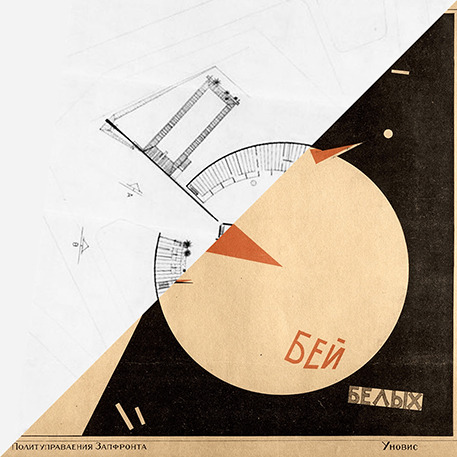
Jean-François Zevaco, Fire Station, Agadir, Morocco, 1954-1963
VS
El Lissitzky, Beat the Whites with the Red Wedge, 1919
#architecture#plan#morocco#fire station#triangle#circle#Jean-François Zevaco#agadir#el lissitzky#propaganda#poster#suprematism#suprematist#Russian avant-garde#Vkhutemas#October Revolution#Russian Civil War
48 notes
·
View notes
Text

Yesterday we celebrated the anniversary of Lenin's death.
A cynical manipulator, after coming to power under the guise of "defending the revolution", created one of the most repressive systems of oppression known to history. He was also responsible for the destruction of the ideals of the October Revolution and for the death of thousands of anarchists and socialists who opposed his dictatorship.
Wczoraj obchodziliśmy rocznicę śmierci Lenina.
Cyniczny manipulator , po dojściu do władzy pod płaszczykiem "obrony rewolucji " stworzył jeden z najbardziej represyjnych systemów ucisku jakie znała historia. Odpowiedzialny był też zniszczenie ideałów rewolucji październikowej i za śmierć tysięcy anarchistów i sprzeciwiających się jego dyktatowi socjalistów.
#rest in piss#rot in piss#vladimir lenin#marxism leninism#marxist leninist#leningrad#lenin#oppression#repression#history#fraud#fake#liar#october revolution#genocide#no pride in genocide#class war#dictatorship#dictator#bigot#hypocrite#fascism#statism#random facts#fun facts#jack facts#interesting facts#facts#fact#ausgov
5 notes
·
View notes
Text

Red Guards having a rest around a campfire on the street in October, 1917.
Photographer: Iakov Vladimirovich Steinberg
#red guards#1917#october revolution#russia#patrolling#communists#revolutionaries#marxism leninism#group photo#photo#historical photos
209 notes
·
View notes
Text
I really like the political conversations in Will Darling. In Slippery Creatures, the bad guy has some powerful truths and valid arguments to put down that any leftist would agree with, until the logic inexplicably runs into a wall that only fanaticism can punch through.
“So Zodiac pits itself against the corruption of wealth, and the structures of entrenched power.” Libra’s eyes lit as he spoke. “We want to bring it down, Mr. Darling, all of it. The palaces, whether Westminster or Buckingham. Whitehall and the White House, the Champs-Elysées and Wall Street. The whole sordid structure of capital and empire, built on lies and designed to oppress the common man. Men like you, sent to war as cannon fodder for a squabble between royal cousins, then brought back and flung on the scrapheap because the country that demanded you should bleed won’t pay for your bandages. We want to sweep it all away, destroy the systems and begin again, this time with all men equal.”
“Sounds good,” Will said. “And that starts with spreading plague?”
“It starts with destruction. There’s no choice. When the French Revolution beheaded a king, they merely created the space for an emperor. The Germans made themselves a republic and cried out for socialism, yet their new national assembly is still filled with the upper classes, the same faces as before. If Mr. MacDonald’s Labour Party should be elected, how long do you think it will take before Labour members of parliament emerge from the ranks of the titled and wealthy? Power clings to power: that is the universal truth, and tinkering at the edges of the great structures of power will not change anything. We must raze them to the ground.”
Will nodded slowly. The light in Libra’s eyes was a flame now, the sort of flame that lit bonfires under people. He unquestionably believed what he said, and he had a good point, at that. “All right. But how many ordinary people will suffer when you raze everything to the ground?”
“How many suffer now?” Libra demanded. “How many millions died in the war? How many are dying down mines and in factories and on the streets because they can’t afford the rent of a room? Why do we count the cost of change, but not the cost of the world staying the same?”
Will opened his mouth, stopped, considered. “Fair. Powerful, even. One question, though: When we sweep away all the structures of power and start off with a blank slate, what’s to stop the same thing happening again? People want a leader. Say you knock everything down. What I’d expect next is a strong man to come out on top, pull an army together, give himself a nice big house and a fancy hat, and off we go, just like before. Well, just take Russia. Who’s going to prevent that?”
“And that is why we need Zodiac!” Libra said, as if Will was agreeing with him. “This isn’t destruction for its own sake, the childishness of the mere anarchist. Zodiac will bring a new order into being, guided by principles of justice and equality.”
“There’s my answer. The people setting the principles and enforcing them will be the ones on top, won’t they? So who's going to be the first-among-equals of your new paradise?” Kim had mentioned one of them. Will searched his memory. “Your mate Capricorn?”
In Sugared Game, Kim himself recounts his disenchantment with the Bolshevik groups he had used to believe in so fervently.
“Fanatic, idealist.” Kim waved a hand. “I thought there was a better way for everyone. I believed—still do—that the war was nothing but empires squabbling for resources, with the blood of millions used to keep the engine running. I refused to be involved in mass murder, and tried my hardest to be gaoled as a conscientious objector, though my father put paid to that. I sincerely cheered the Revolution in 1917 and looked forward to the British equivalent. And then reports started coming in of the bloodbath.”
“You thought it would be a bloodless revolution? Because you don’t get many of them.”
“I know. But the fact of children lined up and shot—I told myself the aristocracy had brought it on themselves, that they had sowed the wind and were reaping the whirlwind, but by 1919 and the atrocities of the civil war, I couldn’t hide behind that any more. I couldn’t persuade myself mass slaughter was the beginning of a fairer society; I could only think of how the French had guillotined their king and created a vacancy for an emperor.”
Well, yes, Will thought. Obviously whoever came out on top of any society would be a power-hungry arsehole: that was how the world worked. “You really were an idealist,” he said aloud. “Is that so surprising?”
It was, considering his grimy goings-on these days. Or maybe it wasn’t; maybe spoiled innocence tarnished faster than healthy cynicism. The thought gave Will the same uncomfortable feeling as Kim’s scars.
“I was sickened,” Kim went on. “Whereas my comrades, the ones with whom I’d planned a British revolution, were positively thrilled. They talked with enthusiasm about setting up a British Cheka. They wanted a secret police and summary killing of class traitors. Most of them were Oxford and Cambridge men of birth, I should observe.”
“Of course they were.”
“They revelled in the idea of mass execution, bodies in the streets. I can’t convey what it was like to watch civilised people go through the intellectual gymnastics necessary to persuade themselves that state murder was first a regrettable necessity, and then a high treat.”
“I suppose you’d need to,” Will said. “If what you believe in goes wrong, either you let go the belief, or you believe even harder.”
“And it hurts to let go. God, it hurts.”
The whole thing is like a rundown of how you get Tankies. Wanting radical change isn't a bad thing, but radicalism untempered by ethics and humanity horseshoes back to fascism.
#vote blue liberals dont touch this post#tankies#revolutions#social justice#totalitarianism#fascism#leftism#western leftists#will darling adventures#kj charles#october revolution#world war i#historical fiction#queer historical fiction#queer historical romance#book recs#book recommendations#knee of huss
6 notes
·
View notes
Text
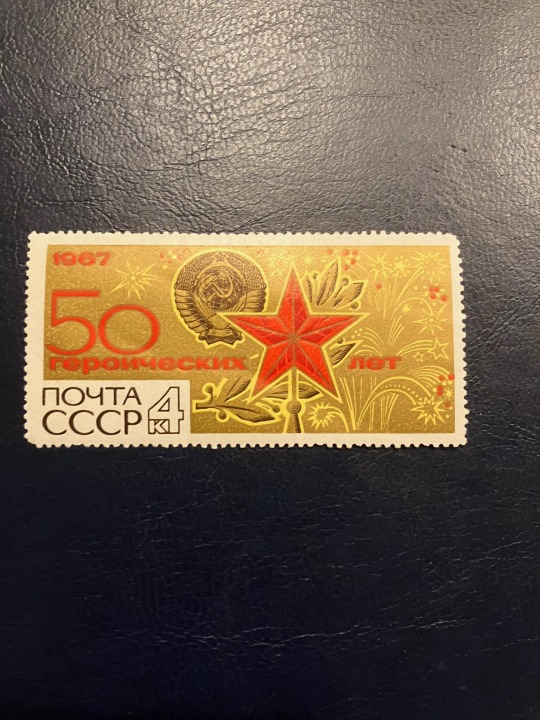
Jó ideje, hogy nem jártunk már a dicső Szovjetunió felé, most viszont egy nagyon díszes, és nagy dög ünnepi példánnyal térünk vissza. Még DOMBORNYOMOTT is, a vörös részeken. Ahogy a bal felső sarokban látható a bélyeg '67-es, és egy 50 éves évfordulós alkalomra készült, számtalan társával együtt, konkrétan egy tíztagú sorozatról beszélünk! A kollekció összes tagja 4 kopejkás, és a designt tekintve, ez a példány a kakukktojás, mivel az összes többin valamilyen orosz/szovjet festő műve látható, azonos strukturában, ezt levéve. Na de mit kellett ilyen nagyon megünnepelni 50 év után?
Természetesen nem másról van itt szó, ahogy biztos sokan kitalálták már mint a nagy októberi szocialista forradalom kitöréséről, ami aztán elvezetett a bolsevik hatalomátvételhez, és tulajdonképpen hosszabb távon a Szovjetúnió létrejöttéhez is.
Röviden kicsit az egészről - szerintem amúgy ezt az érettségi évében tanultuk töriből - ugye értelemszerűen 1917-ben járunk, februárban már lezajlott egy forradalom mely megdöntötte a cári rendszert, és Ideiglenes Kormány alakult az eszerek vezetésével, akiknek talán a legfőbb eltérése a bolsevik ideológiától, hogy a parasztságot tartják az eredendő forradalmi osztálynak, de persze nem csak ez okozta az Ideiglenes Kormány népszerűtlenségét. A legfőbb problémák amik miatt a szovjetekbe tömörödött városi munkásság megvetette őket, a világháborús műveletek folytatása, a parasztoknak ígért földosztás és a rendkívül keménykezű kormányzás volt - nem volt ritka tüntetők lelövése a demonstrációkon a karhatalom által. Ez vezetett az őszi forradalomhoz, ahol a bolsevikok és támogatóik (akik sokkal többe votlak),fellázadtak, és a julián naptár szerint október 25-én, a mienk szerint november 7-én (így már ismerős a dátum...) elfoglalták a Téli Palotát ahol a kormány székelt akkor, de eddigre egyébként sok tízezer katona, matróz és persze munkás is a felkelők oldalán állt. A felkelés vezetője Lenin és Trockij volt.
A forradalomnak persze bőven nem volt teljes a támogatottsága, így véres évek következtek, gyakolatilag innentől számítva megkezdődik az orosz polgárháború (vörösök vs. fehérek, rémlik?), mely teljesen csak 1923-ban jutott nyugvóra, azzal együtt is, hogy a Szovjetuniót 1922 decemberében már megalapítják.
A bélyegsorozat bár impozáns méretű és nagyon arany meg domboros, mivel mindegyikből hárommilliót nyomtak, ezért nem képvisel jelentős értéket, az én postatiszta példányom 150-200 forintot ér(ne), de csorba a széle. A teljes tízdarabos tiszta sorozatot is be lehet szerezni, 1.000-1.500 forintért.
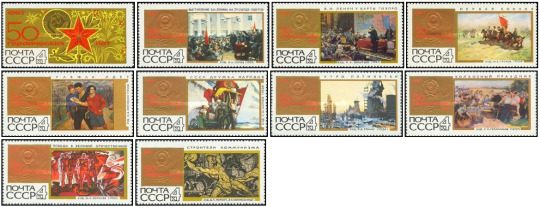
#bélyeg#stamp#szovjetunió#soviet union#cccp#1967#4 kopejka#októberi forradalom#october revolution#bolsevik#lenin
6 notes
·
View notes
Text
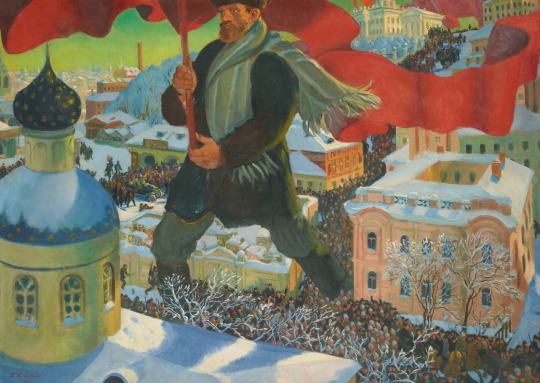
Борис Кустодиев. «Большевик». 1920 год.
Boris Kustodiev. The Bolshevik, 1920.
50 notes
·
View notes
Text
I have (very slowly) been translating the Soviet limited series “December 20” into English
It is about the founding of the Cheka, the Soviet secret police, in the immediate aftermath of the 1917 October Revolution
#socialism#communism#marxism#politics#soviet union#history#Cheka#Soviet#Dzerzhinsky#Lenin#Stalin#NKVD#october revolution#russian revolution
6 notes
·
View notes